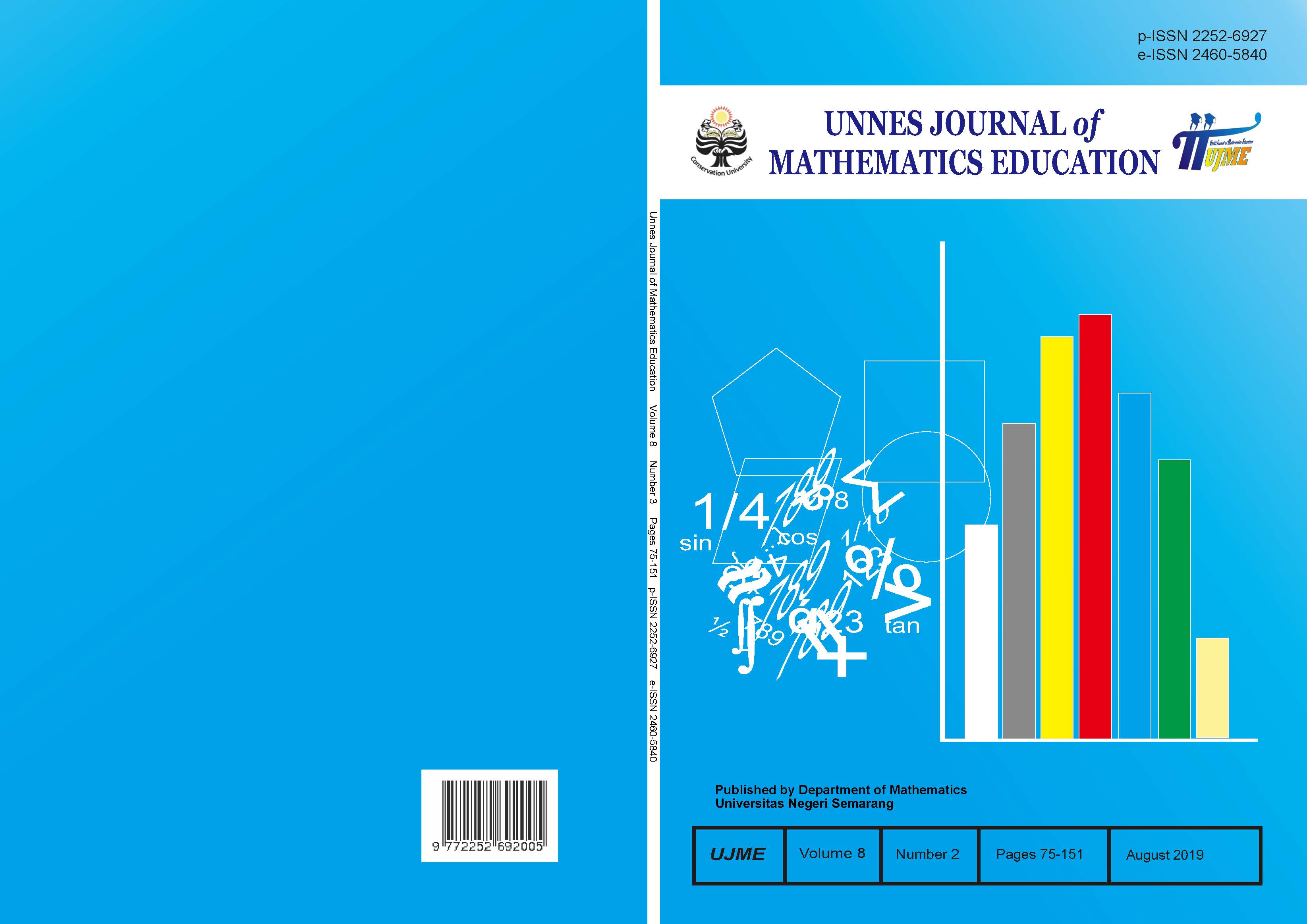The problem solving ability of 7th grade students on problem based learning assisted by mathematics mobile learning application
##plugins.themes.academic_pro.article.main##
Abstract
Developments in mobile technology and mobile phone have significantly improved. Learning using multimedia and networking becomes a mindset that must be applied. The low level of problem solving abilities of students requires educators to apply new approaches on learning. For this reason, this research aims to develop and determine the feasibility of android product based mobile learning application on Problem Based Learning and investigate individual completeness and classical completeness on students' problem solving abilities on Problem Based Learning assisted by Mathematics Mobile Learning Application. This research used the ADDIE model (Analysis, Design, Development, Implementation, and Evaluation). The technique of collecting data uses tests, questionnaires, documentation, observation. The technique of analysis data uses a Likert scale, average test, and proportion test. The product of application was tested on 4 groups of respondents according to the research flow, namely material experts, media experts, teachers, and students of Junior high school 16 Semarang. The android-app products are named learning rectangle. Results 1) Based on the research that has been carried out, mobile learning applications have been developed to support mathematics learning in square and rectangular sub-material for junior high school students. This application is named Learning Rectangle which can be run on an Android smartphone. After going through the feasibility test phase, learning rectangle application is worthy of being used as a support for mathematics learning in square and rectangular sub-material for junior high school students with a percentage of eligibility of 93,68% and included in the criteria of very feasible. 2) Problem solving ability of 7th Grade Students in quadrilateral with rectangular and square sub-material in the PBL model Assisted by MMLA reached the learning completeness criteria. 3) Students' responses to the application have a positive effect on students' problem solving abilities in PBL assisted by MMLA, with a determination coefficient of 0,132 or an influence of 13,2% on students' problem solving abilities
##plugins.themes.academic_pro.article.details##
References
Barrett, T. & Cashman, D. (2010). A Practitioners’ Guide to Enquiry and Problem-based Learning. Dublin: UCD Teaching and Learning.
Borba, Marcelo C., etc. (2016). Blended learning, e-learning and mobile learning in mathematics education. ZDM Mathematics Education. 48(5), 589-610.
Branch, Robert Maribe. (2009). Instructional Design: The ADDIE Approach.New York:Springer ScienceþBusiness Media
Cahyono, Adi N., Miftahudin. (2018). Mobile technology in a mathematics trail program: how does it works? Unnes Journal of Mathematics Education, 7(1), 24-30.
Depdiknas. (2003). UU Nomor 20 Tahun 2003 tentang Sistem Pendidikan Nasional. Jakarta : Depdiknas.
Hendri, M., Bambang Hudiono, dan Suratman. (2015). Pemanfaatan mathematics mobile learning application smartphone OS. Android. Jurnal Pendidikan dan Pembelajaran, 4(5), 1-11.
Kemendikbud. (2013). Permendikbud nomor 68 tahun 2013 tentang Kerangka dasar dan struktur Kurikulum 2013 SMP/MTs.
Kemendikbud. (2016). Permendikbud nomor 21 tahun 2016 tentang Standar Isi Pendidikan Dasar dan Menengah.
Lestanti, M. M., Isnarto, dan Supriyono. (2016). Analisis Kemampuan Pemecahan Masalah Ditinjau dari Karakteristik Cara Berpikir Siswa dalam Model Problem Based Learning. Unnes Journal of Mathematics Education, 5(1), 16-23.
Lestari, Kurnia E., dan Mokhammad Ridwan Yudhanegara. (2017). Penelitian Pendidikan Matematika. Bandung : PT. Refika Aditama.
NCTM. (2000). Principles and Standards for School Mathematics. Reston, Virginia: National Council of Teachers of Mathematics.
Sanjaya, W. (2014). Strategi Pembelajaran Berorientasi Standar Proses Pendidikan. Bandung: Kencana Prenada Media.
Sudjana. (2005). Metoda Statistika. Bandung: Tarsito
Sulistiyoningsih, T., Kartono, and Mulyono. (2015). PBL Bernuansa Adiwiyata dengan Blended Learning untuk Meningkatkan Kemampuan Pemecahan Masalah dan Karakter Peduli Lingkungan. Unnes Journal of Mathematics Education Research, 4(2), 84-92.
Yoselin, K., Kartono, and E. Soedjoko. (2016). Komparasi Pembelajaran Matematika dengan Model Jigsaw dan GI pada pencapaian Kemampuan Pemecahan Masalah. Unnes Journal of Mathematics Education, 5(1), 33-39.
